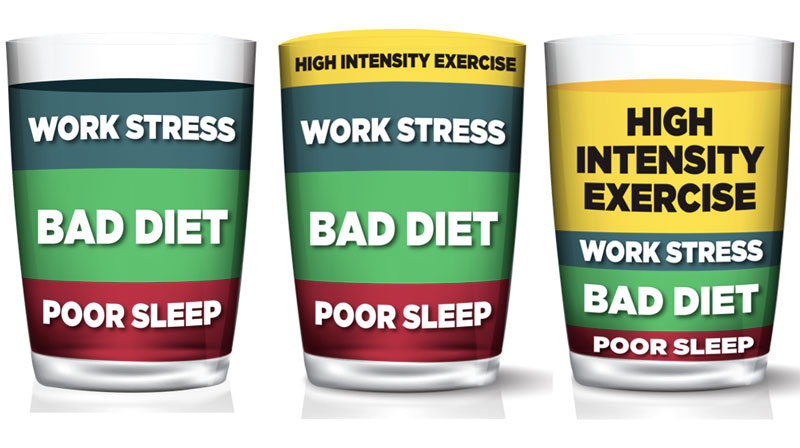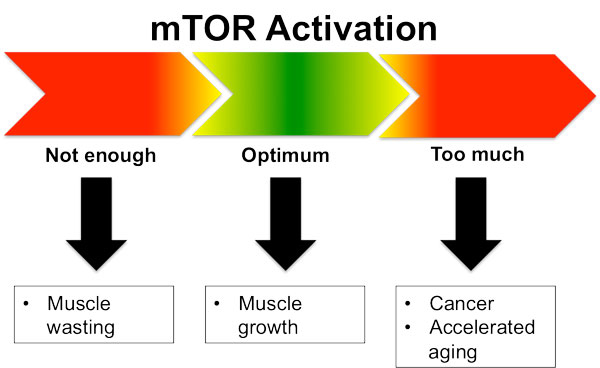- My Forums
- Tiger Rant
- LSU Recruiting
- SEC Rant
- Saints Talk
- Pelicans Talk
- More Sports Board
- Fantasy Sports
- Golf Board
- Soccer Board
- O-T Lounge
- Tech Board
- Home/Garden Board
- Outdoor Board
- Health/Fitness Board
- Movie/TV Board
- Book Board
- Music Board
- Political Talk
- Money Talk
- Fark Board
- Gaming Board
- Travel Board
- Food/Drink Board
- Ticket Exchange
- TD Help Board
Customize My Forums- View All Forums
- Show Left Links
- Topic Sort Options
- Trending Topics
- Recent Topics
- Active Topics
Started By
Message
re: 40% of all US cancer diagnoses due to weight issues. Personal decision making, people!!
Posted on 10/3/17 at 7:51 pm to ThinePreparedAni
Posted on 10/3/17 at 7:51 pm to ThinePreparedAni
From a prior thread...
Other inputs into the "dynamic system" that will not show up on a thermodynamic ledger, but again matter tremendously...

Diet
Activity
Stress Management
Sleep
LINK
What people do not understand (and arguing in this thread) is that these variables need to change depending on:
Your age
What you are optimizing for
You goals
Sleep and stress management are non negotiable and will torpedo anyone trying to optimize diet/activity. These must be held in check.
So that leads us diet/activity:
The name of the longevity and quality of life game is to:
-maximize / optimize glucose partitioning
-practice relative caloric restriction
-preserve healthy skeletal muscle mass (the metabolic site optimizing glucose partitioning) while not over-promoting mTOR/ IGF-1 pathway (tumorigenic)
-optimizing the gut microbiome

LINK
A diet high in fat with moderate protein and relative carbohydrate restriction accomplishes the goals above while maintaining a robust quality of life. Strong hormonal satiety is invoked by a diet high in fat/protein. This allows for interval episodes of fasting (intermittent fasting) and less meals per day (if you believe in the limiting exposures to food additives sort of logic). Most would argue that this is the way the human species evolved to eat and manage food scarcity. In modern times it promotes compliance with a dietary lifestyle change.
Metrics such as grip strength, waist to hip ratio <0.9, and wether you can get up from a chair or the ground without assistance become very simple / practical predictors of longevity. Muscle preservation /strength set the tone for this resilience.
If your diet is dialed in, you have many more options with manipulating training volume.
If you are a professional athelete or elite solidier paid to train, it may be easier for you to handle massive training volume (assuming you are resting / managing stress)
If you are a 40 y/o Dad with 3 kids and a regular job, increased training volume becomes a physical, mental, and social stress. Increasing training volume becomes problematic.
The one constant that optimizes both examples (and all folks for that matter) is optimization of the diet.
Other inputs into the "dynamic system" that will not show up on a thermodynamic ledger, but again matter tremendously...

Diet
Activity
Stress Management
Sleep
LINK
What people do not understand (and arguing in this thread) is that these variables need to change depending on:
Your age
What you are optimizing for
You goals
Sleep and stress management are non negotiable and will torpedo anyone trying to optimize diet/activity. These must be held in check.
So that leads us diet/activity:
The name of the longevity and quality of life game is to:
-maximize / optimize glucose partitioning
-practice relative caloric restriction
-preserve healthy skeletal muscle mass (the metabolic site optimizing glucose partitioning) while not over-promoting mTOR/ IGF-1 pathway (tumorigenic)
-optimizing the gut microbiome

LINK
A diet high in fat with moderate protein and relative carbohydrate restriction accomplishes the goals above while maintaining a robust quality of life. Strong hormonal satiety is invoked by a diet high in fat/protein. This allows for interval episodes of fasting (intermittent fasting) and less meals per day (if you believe in the limiting exposures to food additives sort of logic). Most would argue that this is the way the human species evolved to eat and manage food scarcity. In modern times it promotes compliance with a dietary lifestyle change.
Metrics such as grip strength, waist to hip ratio <0.9, and wether you can get up from a chair or the ground without assistance become very simple / practical predictors of longevity. Muscle preservation /strength set the tone for this resilience.
If your diet is dialed in, you have many more options with manipulating training volume.
If you are a professional athelete or elite solidier paid to train, it may be easier for you to handle massive training volume (assuming you are resting / managing stress)
If you are a 40 y/o Dad with 3 kids and a regular job, increased training volume becomes a physical, mental, and social stress. Increasing training volume becomes problematic.
The one constant that optimizes both examples (and all folks for that matter) is optimization of the diet.
Posted on 10/3/17 at 7:51 pm to ThinePreparedAni
Also from another thread:
The easiest way would be to consider intermittent fasting (there is a huge thread on this on the food and drink board). Fast for 16 hours (skip breakfast) and eat in a 8 hour window.
Earn your carbs (as some posters have already pointed out).
2nd heuristic is to eat items that are closer in the food chain to the sun. Example:
plants (fruits ,vegetable) are great
animals (meat/natural fats) and animal products (eggs) that eat grass (great)
highly refined foods in boxes / fast food that have been adulterated by human hands (not so good)
Below are the best recs that likely applies to your mindset (based on what u posted)
Charles Poliquin Recs
Do not listen to the Philistines who insist that it is only about calories in and calories out (akin to telling your friends that the reason Bill Gates is so rich is because he makes more money than he spends. Technically you would be correct, but the statement is not very helpful/informative/actionable). Much more complex than that. Think of food quality, training, stress, sleep as inputs (via hormones) into a dynamic system (hence the recs above)
The easiest way would be to consider intermittent fasting (there is a huge thread on this on the food and drink board). Fast for 16 hours (skip breakfast) and eat in a 8 hour window.
Earn your carbs (as some posters have already pointed out).
2nd heuristic is to eat items that are closer in the food chain to the sun. Example:
plants (fruits ,vegetable) are great
animals (meat/natural fats) and animal products (eggs) that eat grass (great)
highly refined foods in boxes / fast food that have been adulterated by human hands (not so good)
Below are the best recs that likely applies to your mindset (based on what u posted)
Charles Poliquin Recs
quote:
#1: Eat High-Quality Protein For Breakfast
Eating high-quality protein for breakfast from eggs, fish, lean meat, or dairy is a big change most people need to make since high-carb breakfasts are so popular. Switching to protein-rich foods will improve energy levels throughout the day by raising the stimulating transmitter, dopamine. Protein also has the added benefit of reducing hunger and stabilizing blood sugar, setting you up to eat fewer calories naturally.
#2: Plan Meals Around Protein & Vegetables
Being nutrient-dense and lower in calories than similar sized high-carb or processed alternatives, veggies and protein should be your go-to foods for every meal. The protein will make you satisfied and the veggies are high in fiber and water for minimizing sensations of hunger. Add a healthy fat from nuts, seeds, or olive oil and you have a delicious, fat loss friendly meal.
#3: Weight Train Using Compound Lifts
Your first priority for exercise is to train with weights and do the compound, multi-joint exercises, such as squats, chest press, and pull-ups or rows. Such exercises will train the most muscle at a time and they allow you to lift more weight (remember to train with weights that have you reach failure by the 6 to 10th rep).
#4: Do Short Interval Sessions Instead of Long Cardio
Sprint interval training is a powerful tool for reducing body fat because it burns a lot of calories during and in the post-workout recovery period. It also builds muscle and improves levels of enzymes involved in fat burning and metabolic rate. Depending on your training level and situation, you can try intervals ranging from short all-out 30-second sprints to longer, more moderate intensity intervals lasting up to 2 minutes.
#5: Manage Stress With Relaxation Techniques
Besides being unpleasant, chronic stress is the enemy of fat loss because it raises the hormone cortisol. When cortisol is continuously elevated, it tells the body to sock away energy in the form of fat around your middle. High cortisol also stimulates appetite and cravings for high-carb, high-fat foods, which contributes to fat gain. The solution is a well-designed stress management plan that includes relaxation techniques such as deep breathing and mediation.
#6: Aim For A Restful 7 to 9 Hours of Sleep Every Night
Lack of sleep alters hormone balance and negatively affects metabolic rate. It also makes you hungry and reduces recovery from training. After all, during sleep is the time that your body returns to homeostasis and performs all the repair processes it wasn’t able to fit in during your busy day. Damaged tissue is repaired, your brain recovers, and growth hormone is released, having a powerful fat burning effect.
#7: Prioritize Recovery With Optimal Workout Nutrition
The right workout nutrition will allow you to optimize training performance and ensure you recover ASAP. Have a high-protein, healthy fat meal pre-workout instead of refined or simple carbs. Supplement with electrolytes and water during training, and get high-quality whey protein in the post-workout period. Additional training/recovery aids such as caffeine, creatine, beta alanine, BCAAs, citrulline, and glutamine may give you an extra edge.
#8: Control Inflammation
Acute (short-term) inflammation is a natural part of the recovery process, but it can easily get out of control with bad habits (lack of sleep, a poor diet, excessive stress) and make fat loss harder by affecting metabolism. Certain foods (turmeric, berries, nuts, chocolate, coffee) contain powerful compounds that protect you from the build-up of inflammation. Including these foods in your diet is the first step, but many people benefit from supplementing with anti-inflammatories such as curcumin, which is derived from the spice turmeric.
#9: Favor Short Workouts Over Excessively Long Ones
Many people think long workouts are the key to fat loss. They report the hours logged daily with pride and hope, but the reality is that once your training session passes 60 minutes, intensity drops and cortisol rises. Instead, use more frequent, short workouts to get the most out of your time and effort.
#10: Eat A Variety of Healthy Fats
Eating a low-fat diet is discouraged because it is associated with poorer health outcomes and deprives the body of fat-soluble nutrients (vitamins A, D, E, and K) and the compounds needed to make hormones. Plus, many fats contain nutrients that reduce inflammation and improve blood flow in the body. Enjoy a variety of fats from nuts, seeds, fish, meat, dairy, olive oil, and avocado for delicious diet and leaner body composition.
Do not listen to the Philistines who insist that it is only about calories in and calories out (akin to telling your friends that the reason Bill Gates is so rich is because he makes more money than he spends. Technically you would be correct, but the statement is not very helpful/informative/actionable). Much more complex than that. Think of food quality, training, stress, sleep as inputs (via hormones) into a dynamic system (hence the recs above)
Popular
Back to top

 1
1





